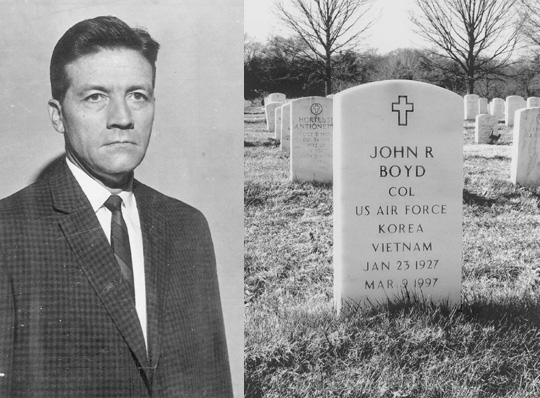John Boyd as a Model of Free Thinking

About a year ago, I wrote a post that mentioned John Boyd (1927 - 1997), a US Air Force pilot, military strategist, and fighter aircraft tactician, as an example of someone who spoke out consistently against the negative effects of careerism on the military.
Along the same lines, this past April Robert Gates, the US Secretary of Defense, cited Boyd as "a historical exemplar" that today's officers would do well to emulate in order to make substantial contributions to meeting the Air Force's pressing need to become more strategically adaptable.
Gates notes that Boyd
had to overcome a large measure of bureaucratic resistance and institutional hostility.Gates devoted the rest of his remarks to further elaboration of his view that an "unconventional era of warfare requires unconventional thinkers." In the question-and-answer session that followed his remarks, he suggested that "the biggest challenge for out-of-the-box thinking is the wisdom of the senior leader who sees the value of that kind of thinking and protects it and the people who do it." I.e., the way to resolve the tension between people seeking to build reasonably secure careers for themselves, and speaking up in dissent when that's what circumstances require, is for senior leaders to make their organizations safe for unconventional thinking.
He had some advice that he used to pass on to his colleagues and subordinates that is worth sharing with you. Boyd would say — and I quote — "One day you will take a fork in the road, and you're going to have to make a decision about which direction you want to go. If you go one way, you can be somebody. You will have to make compromises, and you will have to turn your back on your friends. But you will be a member of the club, and you will get promoted and get good assignments. Or you can go the other way, and you can do something, something for your country and for your Air Force and for yourself. If you decide to do something, you may not get promoted, and you may not get good assignments, and you certainly will not be a favorite of your superiors, but you won't have to compromise yourself. To be somebody or to do something. In life there is often a roll call. That's when you have to make a decision: to be or to do."
For the kinds of challenges America faces and will face, the armed forces will need principled, creative, reform-minded leaders, men and women who, as Boyd put it, want to do something, not be somebody.
Labels: Decision-making, Employee performance management, Innovation, Leadership, Military training, Organizational culture, Rewards and recognition
<< Home